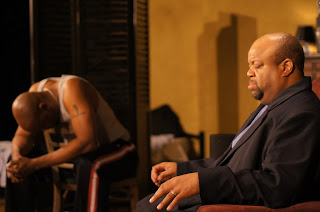Judge Biddle Brought
to the Broadway with Joanna McClelland Glass’ “Trying”
Words by Kristen Fogle
“Trying” is the real life
account of Joanna McClelland Glass’ own experience working for the
internationally known Francis Biddle, Attorney General under President Franklin
D. Roosevelt and Chief Judge of the Nuremberg trials. The play takes place in
1967 when Judge Biddle is 81 years old, and his wife has forced a new secretary
on him, “Sarah with an h,” a 25 year old Canadian who manages somehow to be
both meek and sharp tongued simultaneously. This last trait in particular
causes some clashes with the cantankerous Biddle; however, he comes to respect
Sarah and not only allows her the run of the office but gradually into his
personal life, exposing his losses over a lifetime.
“Trying” has many layers… The title, primarily,
makes reference to Biddle’s career as a judge. It also refers to someone who is
“trying” the other’s patience (which both Biddle and Sarah manage to do over
the course of the play), and it comments on the act of “trying,” or “attempting,”
something. These last two meanings are at the crux of the drama. Sarah, at
times begrudgingly, attempts to get through to the aging judge while the judge (absolutely
begrudgingly) attempts to get on whilst aging. We assume Sarah attempts at all
as a way of getting away from an unsatisfying marriage (she reveals this to
Biddle when she lets on that she is pregnant), but also because she has a need
to learn, which Biddle is more than happy to accommodate. Perhaps one of the
best reasons to view “Trying” is to bear witness to these glimpses of education
that the real life Glass experienced from the informative Biddle.
As
said, “Trying” was inspired by playwright Glass' own experiences while she
worked as personal secretary to Biddle from 1967-1968. She did not, however,
write “Trying” until thirty years later. In a 2003 interview with Emilie Syberg, Artistic Assistant of Chicago’s Victory
Gardens Theater, during a preliminary reading, Glass seems to elude that waiting to
write “Trying” was to her benefit: “I think this particular play required me to have a
deeper knowledge of aging and illness. Of one’s mortality.” And though Glass
says she didn’t think that she found herself editing or commenting on her younger
self in the writing process, she did admit: “Of course, the play was buried,
and it’s hard to remember impressions that were made so long ago.”
Whether
Glass did an astute job of fairly characterizing Biddle is unknown, but she
certainly does take pains to create precise, lengthy dialogue between Sarah and
Biddle in this substantial piece—an impressive feat as “Trying” was originally
a wee one act.
Randall Hickman, Broadway co-owner and director
of the show, reveals that the Broadway does one “take a chance” piece in their
season per year and ”Trying” was that piece. However, after successful runs at
the Old Globe and with Lamb’s Players, San Diego County already seems to
appreciate “Trying.” Hickman echoes this sentiment when he discloses (on
Facebook) that his Broadway audiences have given the play rave reviews thus far.
Broadway’s loyal fans are obviously impressed with
actors Jim Clevenger (Biddle) and Annelise Threlkeld (Sarah). Clevenger, in
particular, exercises several layers in playing the decrepit Biddle. He has
created a character that is staunch in his ideas (annoyingly so), but evokes a
tenderness to Biddle so that we truly empathize with him. This is not entirely
shocking coming from the accomplished Clevenger; in addition to being the
Artistic Director of Escondido’s Patio Playhouse, he has been seen on stage at
venues such as the Avo, Moonlight Amphitheatre, North Coast Rep, POWPAC, and
Scripps Ranch.
And cute as a button Annelise Threlkeld plays Sarah
Schorr well; her characterization of Sarah is good in that she is commanding
enough to make Biddle’s respect for her highly believable. I would have liked
to have seen more arc to her interpretation though; sometimes her presence as a
very “together” young woman made for an impenetrable stoicism and restraint
that we never see her fully break through. But, like Clevenger, she is fun to
watch, and an excellent model for all the delightful office fashions of the
day—praise to Hickman for his very appropriate (and very enviable) costuming
choices.
In the
interview with Emile Syberg, Glass makes a good point about the look and feel
of a set: “A set designer can really set a tone that you never expected—for
example, you can write about a Catholic family and a designer might have
rosaries all over the set. You don’t know what to expect as you see the same
text in various theatres.” True, but one thing set constructor (and theatre
co-owner Douglas Davis) and set designer Hickman do well are stylizing their
space; there is no doubt Glass would have approved. Biddle’s office is
carefully cluttered, properly adorned with objects true to period (even the
filing cabinet is of the obtuse, clunky variety seen in steno clerk’s offices
in the 60s). Dated wood encapsulates the set and cross hatched beams frame the
space (and cast interesting shadows when the lighting allows). In all, the Broadway’s
49-seat theatre helps to make this piece feel more intimate, and I cannot
fathom seeing the production in a much larger house.
At
the Broadway, after “Trying” wraps, “Hot Flashes: The Musical” will come in,
kicking off June 22. (“Flashes” looks like a lot of fun; the tagline to this
one reads: “I don’t have hot flashes. I have short, private vacations in the
tropics.”) And actors of a certain age seem to be the theme with Hickman/Davis
productions this summer; “Too Old for the Chorus, But Not Too Old to be a
Star”—a musical revue—will play June 14-24 at the Welk Theatre.
“Trying”
Broadway Theater
340 East Broadway
Vista, CA 92084
760-806-7905
www.broadwayvista.com




